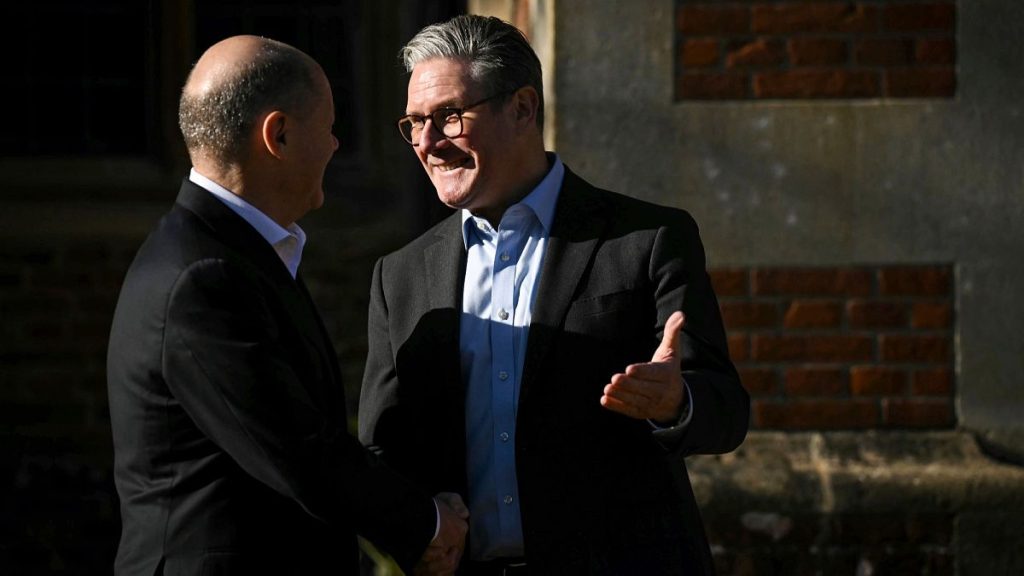In a recent exchange, former US President Donald Trump labeled Ukrainian President Volodymyr Zelenskyy a “dictator,” triggering backlash from several European leaders. UK Prime Minister Keir Starmer and German Chancellor Olaf Scholz were among those who swiftly defended Zelenskyy’s democratic credentials. The incident unfolded against a backdrop of heightened tensions following Ukraine’s suspension of elections amidst ongoing martial law, invoked after Russia’s invasion in February 2022.
| Article Subheadings |
|---|
| 1) Trump’s Controversial Remarks |
| 2) Reactions from European Leaders |
| 3) The Context of Ukraine’s Elections |
| 4) Discussions on Peace in Ukraine |
| 5) Summary and Implications |
Trump’s Controversial Remarks
During a recent press conference in Florida, former President Donald Trump caused a stir when he referred to President Volodymyr Zelenskyy as a “dictator.” His comments focused on Zelenskyy’s decision to suspend elections in Ukraine. Blaming Zelenskyy for the ongoing situation, Trump claimed the Ukrainian leader was ignoring democratic norms and not allowing elections to take place. This critique came amidst ongoing tensions between the United States and Russia, with Trump also advocating for negotiations between the two. Trump’s rhetoric suggested that he views Ukraine as partially responsible for its own challenges, diminishing the context of Russia’s aggression.
Reactions from European Leaders
European leaders were quick to respond to Trump’s remarks, emphasizing the legitimacy and democratic standing of Zelenskyy. UK Prime Minister Keir Starmer firmly stated that Zelenskyy is a democratically elected leader, which legitimizes his temporary suspension of elections due to wartime conditions. Echoing this sentiment, German Chancellor Olaf Scholz took to social media to call Trump’s remarks “simply wrong and dangerous,” arguing that denying Zelenskyy’s democratic legitimacy undermines the reality of Ukraine’s situation amidst invasion.
Swedish Prime Minister Ulf Kristersson criticized Trump’s use of the term “dictator,” describing it as incorrect. German Foreign Minister Annalena Baerbock echoed similar sentiments, denouncing the relevance of Trump’s statements by emphasizing the actual state of governance in Russia and Belarus, which endure under oppressive regimes. The backlash from the European leaders highlights a growing concern about the implications of such comments on international perceptions of the Ukrainian leadership.
The Context of Ukraine’s Elections
The controversy arises as Ukraine navigates complex challenges stemming from Russia’s full-scale invasion. Following the outbreak of war in February 2022, Ukraine enacted martial law which necessitated suspensions of regular elections—justifiable under its constitution and electoral laws. Zelenskyy, in response to Trump’s claims, stressed that he is committed to Ukraine’s democratic processes but must prioritize national security amidst an ongoing military crisis. His five-year presidential term is set to expire in May 2024, but the conditions for free elections in a war-stricken environment have grown fraught with challenges.
Additionally, the decision to suspend elections reflects a historical precedent set during World War II in the UK, as Starmer noted. This framing of extraordinary circumstances serves to contextualize Ukraine’s current state of governance and aligns with international norms for wartime leadership. The suspension does not negate the democratic nature of Zelenskyy’s leadership but instead underscores the dire implications of an ongoing conflict.
Discussions on Peace in Ukraine
The backdrop of Trump’s remarks and subsequent reactions coincides with broader discussions surrounding peace efforts in Ukraine. Following the contentious meeting held in Saudi Arabia, aimed at resetting relations between the US and Russia, both Macron and Starmer are scheduled to meet with President Biden to discuss the ongoing war. Leaders are advocating for a seat at the negotiating table for both Europe and Ukraine, emphasizing that discussions about Ukraine’s future must include its rightful representation.
French President Emmanuel Macron articulated three essential conditions for peace, emphasizing respect for Ukraine’s rights in any negotiations. His input reflects a unified European stance on ensuring that Ukraine is not sidelined in discussions that affect its sovereignty and future. As these meetings loom, the interplay between political rhetoric and diplomatic efforts will be crucial in shaping the trajectory toward peace in the region.
Summary and Implications
The exchange between Trump and Zelenskyy, along with the responses from European leaders, signifies the delicate balance of international relations, particularly in the context of Ukraine’s ongoing crisis. Trump’s characterization of Zelenskyy as a dictator, juxtaposed with European leaders’ defenses of Ukrainian democracy, exposes a significant rift in understanding Ukraine’s current leadership amid war. The implications of such statements may reverberate through diplomatic channels, possibly impacting the trajectory of peace negotiations and altering perceptions of both leaders on the global stage.
| No. | Key Points |
|---|---|
| 1 | Trump labels Zelenskyy a dictator, raising concerns over democratic norms. |
| 2 | European leaders, including Starmer and Scholz, defend Zelenskyy’s democratic legitimacy. |
| 3 | Ukraine’s suspension of elections is justified under wartime conditions. |
| 4 | Leaders emphasize the need for Ukraine’s inclusion in peace negotiations. |
| 5 | The situation highlights the complexities of international relations during conflict. |
Summary
In conclusion, the recent comments made by Trump regarding Zelenskyy have sparked considerable debate about democratic integrity during wartime. The robust defense by European leaders indicates a broader concern over the portrayal of Ukraine’s government amidst ongoing hostilities. As diplomatic discussions continue, the direction of international support for Ukraine may hinge on unified stances concerning its leadership and sovereignty during these critical times.
Frequently Asked Questions
Question: Why did Trump call Zelenskyy a dictator?
Trump labeled Zelenskyy a “dictator” as a criticism of his decision to suspend elections in Ukraine due to the ongoing war with Russia, suggesting that it impedes democratic processes.
Question: What was the response from European leaders?
European leaders, including UK Prime Minister Keir Starmer and German Chancellor Olaf Scholz, defended Zelenskyy’s actions as legitimate given the wartime context, emphasizing the importance of democratic governance.
Question: What are the implications of suspending elections in Ukraine?
Suspending elections is in line with Ukraine’s constitutional provisions during martial law, reflecting the necessity of prioritizing national security during the ongoing conflict with Russia.


